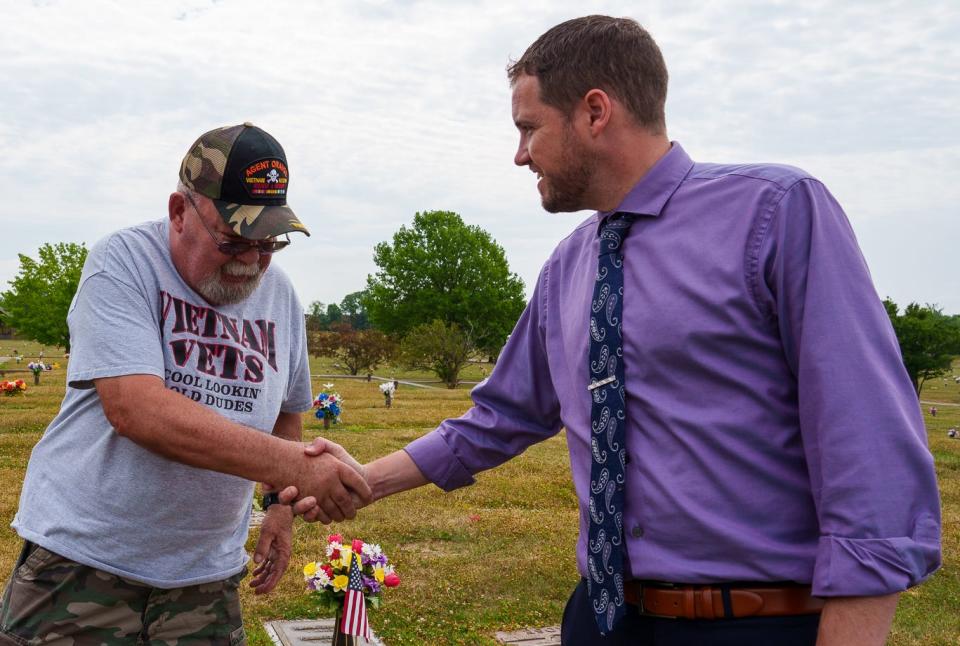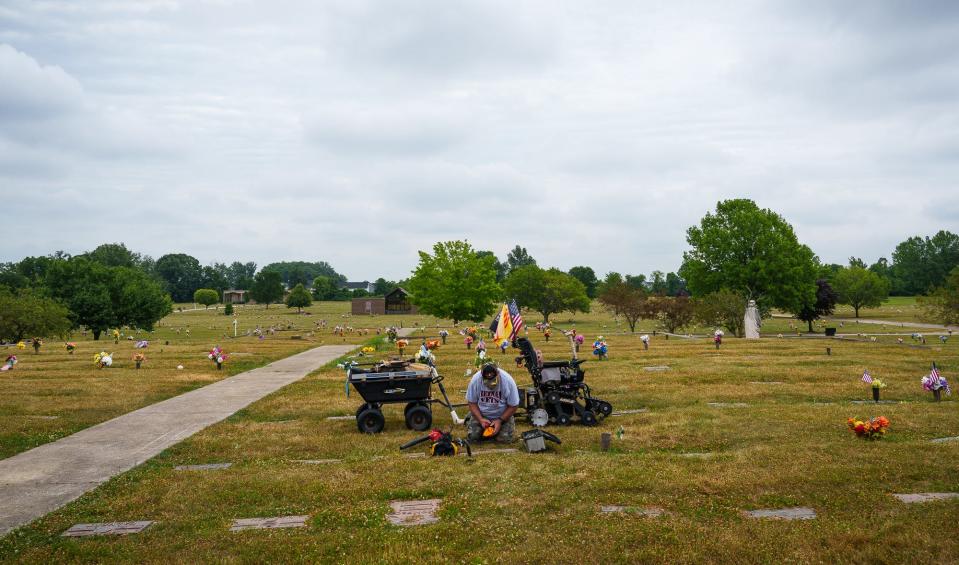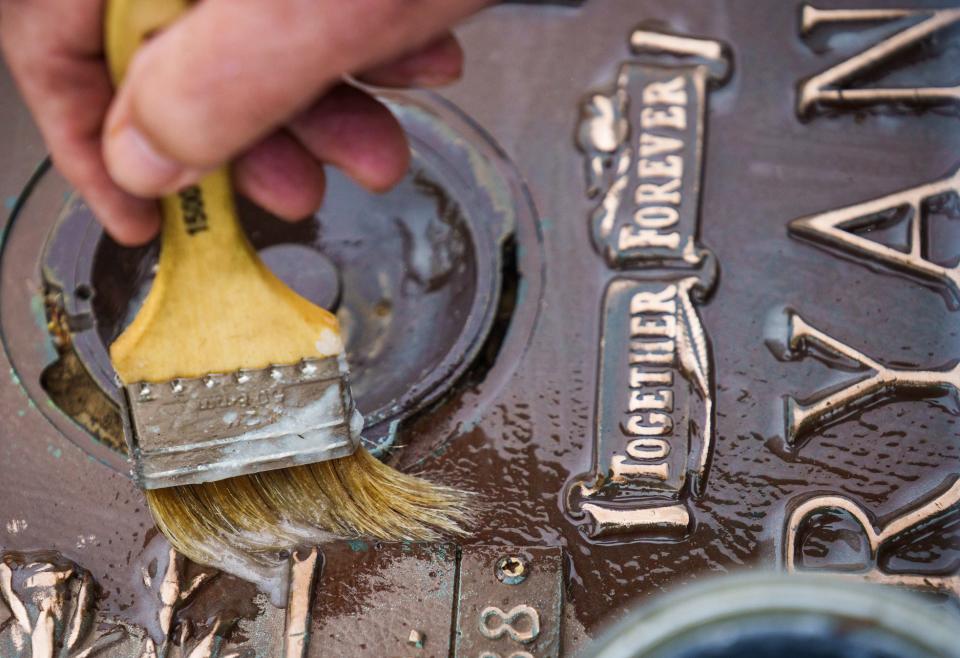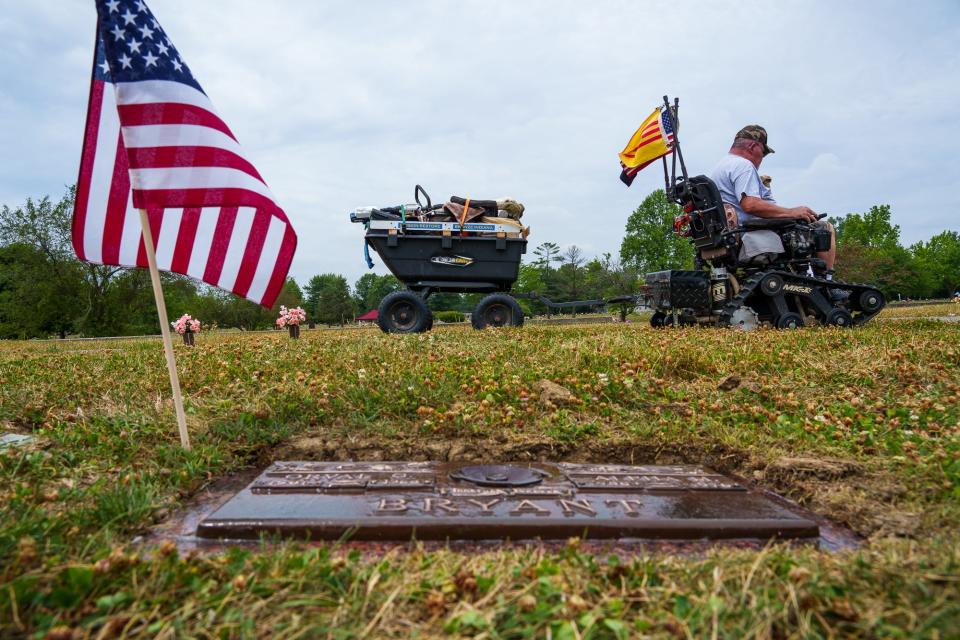Repairing grave markers is like eating potato chips to Rick Brown. He can't fix just one.
Hunched over, propping himself up with one arm with his hand firmly on the earth, Rick Brown delicately digs dirt and debris from the top of an aging grave marker.
He didn't know the man, a veteran, whose marker he's restoring inside Forest Lawn Memory Gardens in Greenwood, but he's delighted to do it.
He has a soft spot for veterans, after all, he is one. His shirt, drenched with sweat, reads, "Vietnam Vets: Cool Lookin' Old Dudes."
Like his father who served in World War II, Brown and all his three brothers served in the military.
Brown, a Greenfield resident, became interested in restoring veteran grave markers in 2015 when he found himself staring down at the bronze military marker at the foot of his father's grave in Richmond.

"It wasn't in terrible shape," Brown said of his father's bronze marker. "It had just gotten dull with age."
Through Facebook, Brown sought advice from Tom Pawlak, founder of Mission Restore Bronze, a non-profit with volunteers restoring military grave markers in cemeteries all across the U.S.
Pawlak gave Brown instruction and a jar of his special Mission Restore Bronze wax concoction.
"He taught me everything that I know about doing bronze markers," Brown said. "He said cleaning bronze markers is like eating potato chips. You can't do just one."
To date, Brown has restored more than 6,000 grave markers, bronze or stone, inside 600 different cemeteries across Indiana.
"In 2018, I cleaned and restored all of the medals of honor recipients that are interred in Indiana," he said. "Altogether it was a total of 50."
As Brown continues cleaning the marker in Greenwood, he switches tools. He uses a wire brush to remove dirt from the granite underneath the marker. Then a small battery-powered blower removes the loose debris.
Now he's working around the marker using a small rotary sander, his body shakes, as does the tool. Brown says he was recently diagnosed with Parkinson's disease.
Brown became disabled in 2002. The main contributor, a traffic accident during his first leave from Vietnam in February 1969. His leg was broken, as was his back with small fractures in multiple areas but doctors didn't see it on the X-ray. The Agent Orange hasn't helped either, he says.
He was hit broadside by a truck, putting him in the hospital for over a year. His leg had to be broken, set, and broken again until the doctors were pleased with the results. He says his left leg is now an inch and a half shorter than the other.
Once released in January 1971, Brown, refusing to go home, returned to Vietnam for a second tour. This time his mission was to remove drugs from the Vung Chua Mountain area.
More:Fred Norris raced into danger to save a downed pilot in Vietnam. Why wasn't he honored?
He says they were successful in about three months' time, bringing the drug rate down significantly. Little did Brown know that years later he would become hooked on opioids himself.
"For several years, I was trapped inside my house drooling on myself," he said. "My primary care doctor came to me and said, 'If you want to get off opioids we have a new program.'"
Brown was all in. For six months, he attended classes five days a week, eight hours a day. He learned what pain is and how it's generated and what takes the place of pain.
He learned Tai Chi and Qi Gong breathing exercises and now uses an electrotherapy device for an hour and a half each morning and night. He says he gets eight hours of pain-free operation after. No more painkillers, he says.
Back at the marker, Brown is wiping away debris with a cloth. He grabs his cane and pulls himself back up to a standing position.
Behind him are an all-terrain Trackchair and a pull cart with everything he needs to restore the marker. Both fit inside a patriotically decorated trailer he pulls with an aging green Jeep Cherokee.

In his pull cart sits a jar of that wax concoction Pawlak created.
"Here's the best part," Brown says as he lifts the container to his nose and takes a big smell. "This is the magic stuff."
He says the wax is a combination of baby oil, paraffin, linseed, wood preservative, and a special ingredient that he says he's sworn to secrecy over.
The wax will ensure no grass or dirt sticks to the marker for some time. About three to five years, Brown says.
He grabs a small paint brush with three-inch bristles and dips it in the wax which is white in color. He's not shy about the amount he slops down onto the marker.
With short brush strokes, Brown works the wax side to side, up and down and in between the intricate wording and ornate details on the marker.

This is Brown's potato chip moment.
In total, 45-minutes have passed. What was a dull, greenish-brown grave marker is now a deep, rich bronze. The wording and details shine in the summer sun.
Before Parkinson's takes away the activity he enjoys so much, Brown says he has one last mission.
He'd like to restore all 219 markers in Marion County of Vietnam veterans killed in action but most of the dead lay within cemeteries where he says he's not welcome.
According to Brown, Flanner Buchanan cemeteries and the cemeteries operated by the Catholic Cemeteries Association of the Archdiocese of Indianapolis have banned him from restoring military markers on their property.
He says he's been asked to provide a letter from next of kin, which isn't always possible.
IndyStar reached out to both Flanner Buchanan and Catholic Cemeteries Association for comment. Neither responded.

As Brown packs up his pull cart, he pauses to stake a small American flag in the ground next to the marker. He then takes a picture to send to the family.
"What you're doing is paying gratitude and homage to the people who came before," Brown said. "All it takes is a little love and care, a little kindness. It doesn't take a lot of time."
Mission Restore Bronze works off donations from the public. Families can request his services through his Facebook page.
This article originally appeared on Indianapolis Star: Rick Brown honors Indiana veterans by cleaning their grave markers
